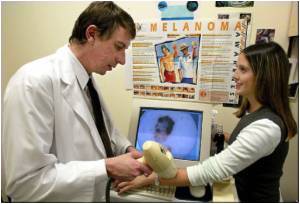
"However, the identity of the proteins secreted by tumors cells enabling the angiogenesis process to occur remains to be determined," he said.
By targeting the proteins that lead to angiogenesis, tumor growth can be halted. In the past, the protein VEGF was identified as a major factor in this process. However, targeting VEGF alone does not prevent tumor development in melanoma patients.
The researchers looked for other proteins involved in angiogenesis and ultimately discovered MIC-1, macrophage inhibitory cytokine-1, as a regulator of this process.
The researchers found that MIC-1 is present in levels five to six times higher in 67 percent of melanoma patients compared to people without cancer.
"This suggests that the MIC-1 protein produced and secreted by these tumors might be performing an important role in the development of melanoma by controlling a key process outside of the tumor," said Robertson.
Advertisement
"Therapies removing MIC-1 from the blood of patients could be used to prevent tumor vessel development and as a result, the tumors would not be able to get bigger because of a lack of needed nutrition and removal of toxic cell waste products. Thus, a drug performing the job of MIC-1 removal would be an important part of a therapeutic arsenal of agents to more effectively treat melanoma," added Robertson.
Advertisement
Source-ANI












